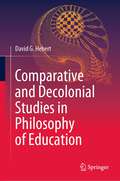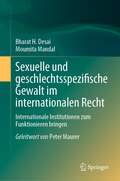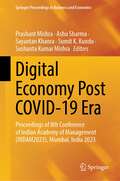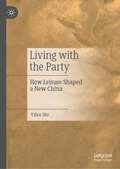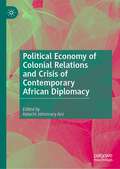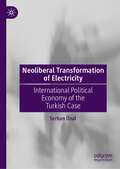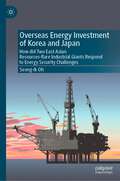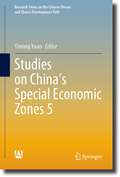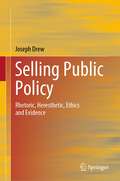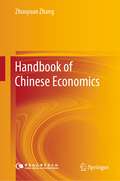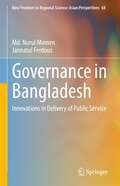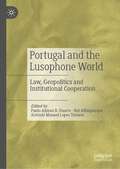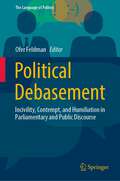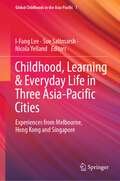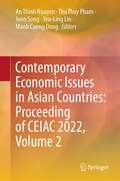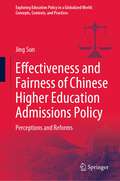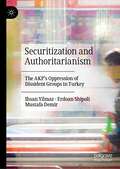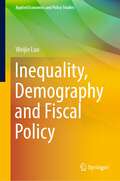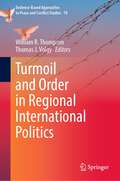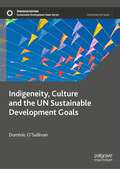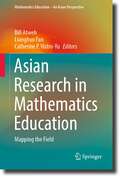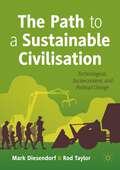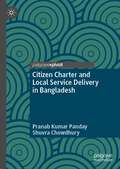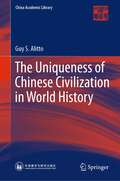- Table View
- List View
Comparative and Decolonial Studies in Philosophy of Education
by David G. HebertThis book introduces the educational philosophies of notable African and Asian thinkers who tend to be little recognized in Europe and North America. It offers specific resources for diversification of higher education curricula. The book expands the philosophy of education, in clear language, to include ideas of major non-western educational thinkers who are little discussed in previous publications. It includes critical analysis of non-western concepts and consideration of their relevance to schools worldwide. The book features discussions of how the work of Tagore and postcolonial thinkers offers diverse visions that increasingly inspire a decolonizing approach to education. This book offers a unique emphasis on how a decolonized philosophy of education can especially enable a rethinking of approaches to education in arts and humanities subjects.
Sexuelle und geschlechtsspezifische Gewalt im internationalen Recht: Internationale Institutionen zum Funktionieren bringen
by Bharat H. Desai Moumita MandalDieses Buch behandelt sexuelle und geschlechtsspezifische Gewalt (SGBV) gegen Frauen aus völkerrechtlicher Sicht. Es zeigt die Gründe für SGBV gegen Frauen auf, wobei der Schwerpunkt auf kulturellen Praktiken liegt, mit denen versucht wird, sie zu rechtfertigen, und verdeutlicht die rechtlichen Herausforderungen im Zusammenhang mit dem Thema sowohl für nationale als auch internationale Justizsysteme. Die sieben Kapitel des Buches sind: i) Einleitung ii) SGBV ein globales Problem; iii) Internationaler Rechtsschutz; iv) Rolle der internationalen Institutionen; v) Rolle kultureller Faktoren und vi) Herausforderungen vii) Schlussfolgerungen. Vor dem Hintergrund konzertierter globaler Bemühungen, SGBV gegen Frauen zu beenden oder zumindest stark einzudämmen, bietet das Buch einen Fahrplan für das System der Vereinten Nationen, Staaten, internationale Institutionen, multidisziplinäre Wissenschaftler, Organisationen der Zivilgesellschaft und andere globale Akteure.Das Buch enthält ein Vorwort von Peter Maurer, Präsident des Internationalen Komitees vom Roten Kreuz (IKRK).
Digital Economy Post COVID-19 Era: Proceedings of 8th Conference of Indian Academy of Management (INDAM2023), Mumbai, India 2023 (Springer Proceedings in Business and Economics)
by Prashant Mishra Ashu Sharma Sayantan Khanra Sumit K. Kundu Sushanta Kumar MishraThis book presents the future directions of the digital economy post Covid-19 era. The chapters of this book cover contemporary topics on digital economy and digital initiatives undertaken by various organizations. Overall, the book shares insights on how organizations can adapt and transform their processes, structure, and strategies to remain relevant and competitive in the new business and economic environment. These insights also emerge from multidisciplinary discussions in various management domains, such as, consumer behaviour and marketing, economics, finance and accounting, entrepreneurship and small business management, environmental, social and governance compliance, future of work, human resource management, leadership, inclusive workforce, information systems and decision sciences, international business and strategy, and operations and supply chain management.
Living with the Party: How Leisure Shaped a New China
by Yifan ShiThis book explores the subcultures, cultural trends and regulations of leisure and subcultures among young people in Beijing from 1949 to the 1980s. It complicates our understanding of the successes of the CCP and the nature of those successes—more a synergy or synthesis than victory over society or defeat. It argues that while the CCP aimed to direct the most private sphere in people’s everyday life (i.e., leisure), it did not achieve this goal by coercive means, but by appealing ways through organized leisure activities. This book suggests that although elements of youth subcultures can be observed throughout the Mao era, we should not treat them as a way of passive resistance. Instead, we must position these subcultures between different layers of the Party’s leisure regulation to examine what the CCP actually achieved. Many people who engaged in subcultures defied the blatant politicization of their leisure, some might have defied the process of collectivization, but few defied the process of institutionalization during which people did not find state intervention contradictory to their own way of pleasure-seeking. This book also suggests that instead of regarding the Deng Xiaoping era as a breakaway from Maoist interventionist rule, we need to see the historical continuity as revealed by the Party’s uninterrupted policy of leisure regulation. Thought provoking and at times amusing, this book will interest sinologists, historians, and scholars of China's social form.
Political Economy of Colonial Relations and Crisis of Contemporary African Diplomacy
by Kelechi Johnmary AniThe book presents a historical account of the colonial foundation of African economy and diplomacy. It reveals how the colonial companies and their agents penetrated different parts of Africa and entrenched Western colonialism and imperialism. Ironically, the arrival of these colonial companies became a driver of colonial labour migration as the educated and few privileged African people have to move towards the location of the colonial companies in order to eke-out improved standard of living. It presents the dynamics of import and export trade as promoted by the colonial companies. Consequently, the second part of the book raised the nature of relations amongst some independent African states. First, it reveals the deep-rooted challenge of poverty, migration problem, xenophobia in South Africa and resource conflicts within sovereign border areas of Nigeria and Cameroon as well as the Ethiopian dam crisis with Egypt, as some negative effects of colonialism on some African states. Secondly, it advocated for the advancement of African sports diplomacy, balancing of Chinese African trade diplomacy and improved labour migration within Africa as some paths to sustainable diplomacy in continent.
Neoliberal Transformation of Electricity: International Political Economy of the Turkish Case
by Serhan ÜnalThis book makes a structural analysis of the neoliberal restructuring in the global electricity industry. The book shows that the electricity liberalisation in different countries is just a reflection of the same structural trend in the global economy and avoids from both narrow country-specific and abstract global approaches by making a structural analysis completed by a case study. Thus, it aims reaching wider conclusions about how global changes in finance and ideology / knowledge structures influence domestic energy and economic policy preferences of developing countries. The book develops a taxonomy about organising principles around which the electricity industry has been structured historically and globally, and reveals drivers of change which influences the current energy transition in the electricity sector. Combining these aspects, the book uses financial and other economic data empirically, to shed light on the structural role of global transformation of the electricity markets on the domestic energy policy preferences of the developing countries. Thus, this work will be useful not only for academic purposes, but also for practitioners dealing with these issues.
Overseas Energy Investment of Korea and Japan: How did Two East Asian Resources-Rare Industrial Giants Respond to Energy Security Challenges
by Seong-ik OhUnder the contraction of global energy supply brought on by geopolitical situation, this timely book addresses how resource-scarce developing countries respond to challenges in energy security. In particular, for countries underpinning efforts for an autonomous supply of energy, either oil/natural gas, nuclear power or renewable energy, this book revisits the evolution of overseas energy investment of two industrial giants in East Asia, Korea and Japan. It will provide meaningful lessons of how the state sets up policies and navigates political procedures for energy security. While a historical case study, it also offers its readers new insight into the international energy market by taking the stark déjà vu in its repetitive nature and putting it into context. The book provides an in-depth study highlighting the differences in political systems which led to contrasting outcomes. The one with a small number of veto players succeeded in establishing and expanding state-owned oil companies while producing policy inconsistency at the same time and vice versa. This comprehensive review of East Asian politics will add value to East Asian Studies by presenting a new approach through a universal theory rather than cultural uniqueness. As a readable case study on energy security, this book will be an essential reference for scholars, policymakers, industry insiders and citizens who are interested in how nations respond to historic challenges in a political and international context.
Studies on China’s Special Economic Zones 5 (Research Series on the Chinese Dream and China’s Development Path)
by Yiming YuanThis book collects the latest academic achievements, research progress and policy propositions on the study of China’s special economic zones, with the aim to reflect the history, new development and new challenges of the construction of Chinese special economic zones. It presents the successful experience of the development of Guangdong–Hong Kong–Macao Greater Bay Area and the changes of its mission and analyzes the problems encountered in the development of Shenzhen special economic zones and the theory of economic system reform.
Selling Public Policy: Rhetoric, Heresthetic, Ethics and Evidence
by Joseph DrewProfessor Drew’s latest work makes the case that even great public policy needs to be deliberately and strategically sold in order for it to ultimately be considered a success. However, it seems that most people charged with the task of selling public policy simply do not have the requisite skills to do so.Selling public policy is an art that draws on disparate strands of scholarship spanning the political sciences, economics, sociology, ethics and the classics. To perform the art of selling public policy one must first master the lessons from the greats in the field. Following this, it is necessary to learn how to apply the knowledge to real-world complex scenarios in such a way that the policy is indeed sold and stays sold over the implied returns period.This book is unique in the corpus of scholarly literature because it provides both the knowledge and real-world case studies required for students, scholars, and policy practitioners to master the art of selling public policy.
Handbook of Chinese Economics
by Zhuoyuan ZhangThis book reviews the development of Chinese economics since the reform and opening-up, associated with the history and experience of China's economic growth. This book makes a systematic study of the direction of reform, the method of reform, the path of reform, the main body of reform and the motive force of reform, accumulates more experiences that can be used for reference for the exploration of new reforms to be opened, and probes into the way of reform in the next period. The topics cover all key concepts and theories relating to the China's economic reform.
Governance in Bangladesh: Innovations in Delivery of Public Service (New Frontiers in Regional Science: Asian Perspectives #68)
by Md. Nurul Momen Jannatul FerdousThis book adopts the multidimensional nature of innovation as its point of focus and offers a comprehensive analysis of contemporary governance issues in Bangladesh. Each chapter views those issues from its own disciplinary perspective, but all share a common focus on the current process in the governance of innovation. The authors show how the processes of innovation and public service delivery are influenced while there is simultaneously a striving for a digital Bangladesh. The book presents innovation as a complex phenomenon with multidisciplinary viewpoints affecting its governance. As well, new practices, developments, and empirical research are shown here. The aim is to point out the most persistent difficulties in public administration and public service delivery, with an emphasis on how to deliver public service in Bangladesh in a sustainable manner. Although significant transformations have been made recently for a better organized public sphere, public services still must be more closely in line with what citizens need rather than what service providers are prepared to deliver. This published work speaks strongly to a wide-ranging audience, from scholars of governance and innovation management to academics, researchers, and postgraduate students interested in public service delivery innovations in Bangladesh and South Asia. Indeed, the book serves as a text and valuable resource for postgraduate courses in politics, business administration, economics, political science, development, and governance in South Asia.
Portugal and the Lusophone World: Law, Geopolitics and Institutional Cooperation
by Paulo Afonso B. Duarte Rui Albuquerque António Manuel Lopes TavaresThis book responds to a serious need for a consistent and comprehensive publication which combines an analysis of Law, Geopolitics and Institutional cooperation within the Lusophone world. Research in the book includes contributions from scholars with diverse educational and professional experiences working in these disciplines, from all around the world. The book will assist readers in comprehending, recognizing and discussing on-going debates about the Lusophone world in the 21st century.
Political Debasement: Incivility, Contempt, and Humiliation in Parliamentary and Public Discourse (The Language of Politics)
by Ofer FeldmanThis edited book is an innovative collection of studies—pioneering scholarship systematically exploring the various features of debasement language used by political leaders in their speeches, statements, and remarks during parliamentary and other official as well as unofficial, private activities. The book examines in particular the forms, functions, and effects of political debasement in Western and non-Western countries, including Spain, Malaysia, the UK, Japan, China, India, Montenegro, Greece, Poland, and Israel. It addresses the growing interest in recent years in issues related to the increase of debasement in the public sphere. These include high-echelon politicians’ invective and vulgarity toward their colleagues in houses of parliament; their abusive and cynical language toward sections of the public, including women and minorities; and their crude sarcasm and irony expressed toward media representatives. The book focuses on those instances where political leaders at the very highest-level employ debasement discourse; it identifies the specific language they use in different political cultures and under different situations; the reasons for using this type of language; and its consequences. The book brings together a team of distinguished political scientists, communication and linguistics researchers, and social and political psychologists, with expert backgrounds and experience in understanding the reciprocal interaction between language and politics, in this case: debasement. They discuss and provide a number of novel insights of theoretical and practical importance regarding debasing discourse, as well as potential avenues for future research on the nature and effect of this type of language.
Childhood, Learning & Everyday Life in Three Asia-Pacific Cities: Experiences from Melbourne, Hong Kong and Singapore (Global Childhoods in the Asia-Pacific #1)
by I-Fang Lee Sue Saltmarsh Nicola YellandThis book introduces findings from an international, cross-cultural, and interdisciplinary study of children’s everyday experiences of growing up and going to school in the context of the three global cities of Hong Kong, Singapore and Melbourne. It takes the premise that children’s learning and orientations to educational success are shaped by everyday cultural practices at home and at school, by policy contexts that both produce and respond to educational and cultural norms, and by individual and familial desires and aspirations. Drawing on research conducted with primary school-aged children in Year 4, the book considers how day-to-day routines such as going to school, engaging in extra-curricular activities outside of school, and spending time at home with family intersect with the broader milieus of education policy ideals in a changing and interconnected world. Through a combination of visual methodologies, surveys, ethnographic observations in schools, classrooms and cityscapes, re-enactments of everyday activities with children at home, and sociological education policy analysis, this book shows both the richness of children’s everyday lives and learning in global cities, as well as exploring questions that pose challenges to educational and social norms.
Contemporary Economic Issues in Asian Countries: Proceeding of CEIAC 2022, Volume 2
by An Thinh Nguyen Thu Thuy Pham Joon Song Yen-Ling Lin Manh Cuong DongThis book continues the discussion from Volume 1 on the general considerations regarding global changes and contemporary economic issues in Asian countries in real terms. It offers a collection of original conference papers from the annual international conferences on “Contemporary economic issues in Asian countries” (CEIAC Conference) commenced in 2022 in collaboration with CIFOR-ICRAF, Sungkyunkwan University (Korea), and Tamkang University (Taiwan). The theme of the CEIAC Conference 2022 deals with broad aspects of the contemporary economic issues in Asian countries. It covers topics such as economics and business (economic theory, national and international income distribution, macroeconomic policies, sectors of economy, productivity developments, financial market, business governance, bank financing, etc.), green economy and sustainable development (developing process, development policy, public policy, sustainable growth, green growth, etc.), and international trade and investment (international trade theory, free trade agreements, tariffs, intellectual property, international law, etc.). The book would interest a wide array of professors, researchers, lecturers, students in fields of economics, consultants, and decision makers interested in the issues related to economic issues in Asia.
Effectiveness and Fairness of Chinese Higher Education Admissions Policy: Perceptions and Reforms (Exploring Education Policy in a Globalized World: Concepts, Contexts, and Practices)
by Jing SunThis book explores effectiveness and fairness in higher education admissions policy. It reviews the literatures from the 1940s until the 2010s and provides a theoretical framework. The book explores comparisons between this framework and the empirical data by interviewing policymakers from the Chinese government as well as admissions officer at Chinese universities. The book contributes to providing underlying theoretical foundation on the future Chinese higher education admissions policy reform. This book appeals to policymakers on all level of education, practitioners of admissions policy, researchers on education policy, and anyone who is interested in this field.
Securitization and Authoritarianism: The AKP’s Oppression of Dissident Groups in Turkey
by Ihsan Yilmaz Erdoan Shipoli Mustafa DemirThis book focuses on securitization and authoritarianism in Turkey with research on the country’s Islamist populist ruling party’s (AKP) oppression of different socio-political, ethnic and religious groups. In doing so, it analyzes how the AKP has securitized to oppress different socio-political groups and identities, according to the time and need for the party's political survival. Research in the book sheds light on the use of traumas, conspiracy theories, and fear as tools in the securitization and repression processes.
Inequality, Demography and Fiscal Policy (Applied Economics and Policy Studies)
by Weijie LuoThis book aims to empirically and theoretically study how income inequality and demographic change affected fiscal policy and subsequent economic growth globally in the past decades from four perspectives. First, it briefly reviews the dynamic changes of income sources that contribute to inequality. Second, it distinguishes between income inequality induced by differences in labor productivity and income inequality induced by differences in capital income. Third, it briefly reviews the dynamic changes of tax composition in the age of demographic change. Last, it discusses the impacts of changes in age structure on the extent of taxes on income relative to expenditure. This book offers a comprehensive discussion to understand and analyze the reason, performance and challenge of fiscal policy and economic growth from the perspective of inequality and demographics.In addition to students, teachers and researchers in the areas of equity, demography, political economy and economic policy, this book is also of great interest to policy makers, planners and non-government agencies who are concerned with understanding and addressing poverty-related and aging-related issues in developed and developing countries.
Turmoil and Order in Regional International Politics (Evidence-Based Approaches to Peace and Conflict Studies #10)
by William R. Thompson Thomas J. VolgyThis edited book complements and follows up on the book, Thompson and Volgy et al, Regions, Power and Conflict: Constrained Capabilities, Hierarchy, and Rivalry. It is predicated in part on the paucity of published material available on comparing regional international politics. Monadic, dyadic, and systemic approaches all have their uses and have been exploited extensively. The same cannot be said about comparative regional analysis. The premise is that a great deal of international politics takes place within regional parameters. Most states simply lack the capability or interest in devoting many resources to extra-regional affairs. Yet each region is distinctive. In some, military coups remain common while they have died out as a form of political practice in others. A few have been highly conflictual and then become more pacific, while others persist in their conflict intensity. Some have powerful neighbors with intervention tendencies, while others are surrounded by relatively weak states. Some are rich; others are poor. The point is that regions, all with proper names, have attributes that can be harnessed through comparison to explain why regional behavior differs greatly across the planet. The aim is to replace the proper names with the leading variables that appear to drive behavior. For instance, to shrug and say “that’s the Middle East for you” does not take us very far. Replacing the Middle East label with conceptualization about how a set of small, weak, autocratic states behave subject to high penetration by major powers might take us farther than shrugging off regional identity. We have good reasons to think that comparative regional analysis can deliver an explanatory value-added product just as much as alternative “levels of analysis” can. Ultimately, we might desire to integrate separate levels of analysis, rather than segregating them. But in the short term, we need to encourage comparative regional analysis because it is the least developed perspective. Why that might be the case can be debated, but it stems in part from our disciplinary tendencies for some analysts to specialize in regional behavior largely in a descriptive vein while others prefer to focus on explaining universal behavior. Comparative regional behavior tends to be squeezed out by regional scholars who suspect generalization about behavior and universal scholars who suspect particular contexts such as regions. Comparative regional analysis requires analysts who are willing to explore generalization but acknowledge regional contexts more explicitly than is customary. At the same time, more general substitutes for those regional labels must be introduced if explanatory headway is to be achieved.
Children’s Lifeworlds in a Global City: Melbourne (Global Childhoods in the Asia-Pacific #3)
by Clare Bartholomaeus Nicola YellandThis book examines the connections between policy, school experiences, and everyday activities of children growing up in the global city of Melbourne, Australia. It provides an in-depth consideration of Melbourne primary school children’s lifeworlds, exploring everyday stories and practices inside and outside of school. This includes consideration of the diverse ways that educational “success” may be understood in the context of Melbourne, productively moving beyond a narrow focus only on academic achievement. Situated alongside policy and curriculum analysis, the book draws on research in Melbourne Year 4 primary school classrooms in the form of student-completed surveys, classroom ethnographies, and student responses to a learning dialogues activity, as well as video re-enactments of out-of-school life. Through this it explores key aspects of children’s lifeworlds with a focus on school timetabling and pedagogical encounters, school engagement and belonging, and activities and everyday routines outside of school. This book offers a comprehensive and holistic exploration of children’s lifeworlds in Melbourne, drawing connections between children’s lives inside and outside of school, and the broader policy contexts.
Indigeneity, Culture and the UN Sustainable Development Goals (Sustainable Development Goals Series)
by Dominic O’SullivanThis is the first scholarly book to examine the UN Sustainable Development Goals from an indigenous perspective and, specifically, with reference to the right to self-determination. It refers to the UN Declaration on the Rights of Indigenous Peoples and domestic instruments such as New Zealand’s Tiriti o Waitangi to suggest how the goals could be revised to support self-determination as a more far-reaching and ambitious project than the goals imagine in their current form. The book primarily draws its material from Australia, Canada, and New Zealand to support analysing the goals’ policy relevance to wealthy states and the political claims that indigenous peoples make in established liberal democracies.
Asian Research in Mathematics Education: Mapping the Field (Mathematics Education – An Asian Perspective)
by Bill Atweh Lianghuo Fan Catherine P. Vistro-YuThis book focuses on the development of research in mathematics education cultures and its products from the perspective of local educators. It consists of contributions from Mainland China, Indonesia, Korea, Macao, Singapore, the Philippines, and Turkey. This book examines the development of the culture of research in the respective countries and also reviews the research conducted in the recent past in mathematics education. It takes a critical stance through identifying the various accomplishments, and identifying challenges for the future of research in terms of its diversification and quality. Divided into two sections, the first section considers factors around the development of a research culture in the respective countries by focusing on the means used to develop research expertise and quality. The second section consists of overviews of the area of research and methodologies conducted in mathematics education in the various countries, with the intention of highlighting the research topics conducted as well as discussing omissions of such research.
The Path to a Sustainable Civilisation: Technological, Socioeconomic and Political Change
by Mark Diesendorf Rod TaylorThe Path to a Sustainable Civilisation shows that we have unwittingly fallen into an existential crisis of our own making. We have allowed large corporations, the military and other vested interests to capture governments and influence public opinion excessively. We have created a god called ‘the market’ and allowed our most important decisions to be made by this imaginary entity, which is in fact a human system controlled by vested interests. The result has been the exploitation of our life support system, our planet, and most of its inhabitants, to the point of collapse. This book argues that the way out of our black hole is to build social movements to apply overwhelming pressure on government and big business, weaken the power of vested interests and strengthen democratic decision-making. This must be done simultaneously with action on the specific issues of climate, energy, natural resources and social justice, in order to transition to a truly sustainable civilisation.
Citizen Charter and Local Service Delivery in Bangladesh
by Pranab Kumar Panday Shuvra ChowdhuryThis book illuminates the importance of the citizen charter (CC) in local service delivery in Bangladesh. It describes how CC was implemented into the service delivery process and its impact. In the 1970s, the transition from traditional public administration to new public management was inspired by globalization, the emergence of an information and technological society, and many economic theories, such as public choice, principal-agent theory, and transaction cost. The purpose of the government in a welfare state is to serve the citizens by providing essential services. However, public service delivery in most developing nations is ineffective owing to corruption, waste of public funds, a lack of responsibility on the part of public employees, etc. In this context, CC emerged as a means of educating individuals on many elements of services, so they may hold service providers accountable. Thus, the issue of framing and implementation of CC has been put in place due to the persistent pressing of academicians, politicians, and practitioners advocating for better local service delivery.
The Uniqueness of Chinese Civilization in World History (China Academic Library)
by Guy S. AlittoThe book is a meticulous work in answering these questions which often occur to foreigners as well as modern Chinese themselves at the thought of the old China and its experience in modern times: What is Chinese civilization? How could it exist for several millennia and spread that far? Is there anything inherent in this civilization?From the standpoint of an “outsider” to this civilization, the author incorporates various elements, such as geographic factors, language, thoughts, with the recurrent themes along the two thousand years and changes throughout, rather than simply following a lineal progression. His historiographical approach, the methodology of eclectic common sense, as he termed it, is a new try in this field and will present a brand new perspective for both readers and researchers in that field.
